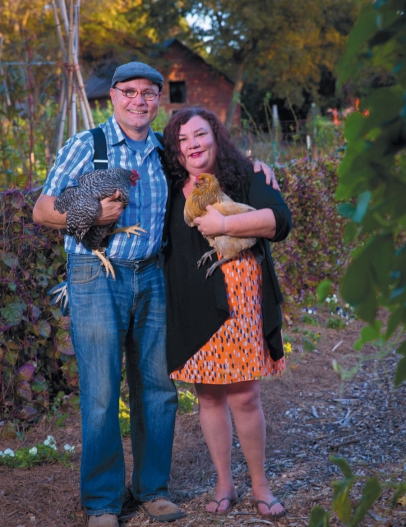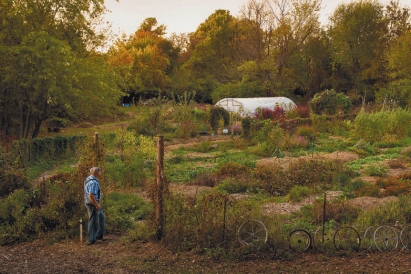Growing Community at Tri Cycle Farms
“I only eat vegetables from Tri Cycle Farms!” exclaims one young boy after his visit to the urban farm. So what is this mystical land that gets children to not only eat their veggies, but like them, too? Centrally located off Garland Avenue in Fayetteville, Tri Cycle is a nonprofit, urban farm nestled within a neighborhood just minutes from the University of Arkansas campus. Its 2 acres are home to a medley of vegetables, herbs, flowers, and fruits.
Though many people credit Don Bennett, a longtime Fayetteville resident, as Tri Cycle Farms’ founder, he is quick to point out that the dream manifested through the united determination of many locals. This effort represents the core mission of Tri Cycle Farms: “Growing community through soil.”
Arkansas is one of the most food-insecure states in the nation. Within a one-mile radius of the farm, more than 43 percent of the residents are classified as food insecure. However, the farm does not exist merely to grow food for the impoverished. It also develops a sense of community while building leaders.
Don and his partner, Kelly Bassemier, live on the property, which happens to be the 2-acre backyard that Don had enjoyed looking at, but did not own, for more than 25 years. Four years ago, multiple factors in Don’s personal life lead him to a group of supporters who together determined they would start a community farm, right in the center of Fayetteville. The land was secured, and ground was broken for the farm. One individual who joined that group in 2011 was Joanna Pollock, an environmental dynamics doctoral student from the University of Arkansas studying community resilience.
“I had been looking for years for a convenient place to learn how to grow food with others because it is a critical skill to have,” says Joanna, who is now a Tri Cycle Farms board member. She says she knew immediately that she wanted to join the Tri Cycle Farms mission and devote her energy to this place. “I had found (other) places, but none had been convenient. This land was geographically in the heart of the city, and now it feels to me that in many ways it has become the figurative heart of the city.”
Several classes, taught by local specialists, are hosted both in the field and within the farm’s iconic rock house: the Community House. These classes are donation-based, and allow Tri Cycle Farms to expand its mission to the community. Even the name “Tri Cycle” stems from the three-part model that the farm strives to maintain: farming, teaching, and sharing.
The latter expands to the “Third Share Initiative,” which refers to the food grown on the farm and its subsequent allocation. One-third of what is grown is shared with volunteers, another third is given to food pantries and community meals, and the final third is sold to support the farm.
Tri Cycle Farms’ partners extend across the state, but most visible may be the church just across the street. Trinity United Methodist Church, together with several other churches, hosts “Sunday Supper,” a weekly meal open to the community. Tri Cycle Farms donates food for this community outreach as part of the “given” third of food grown.
In turn, the church donates space for the Crossroads Farmers Market every Friday from 3-7 p.m. With space for up to 10 vendors, the market is notably smaller than others in the region. Crossroads’ qualifications for vendors allow the market to maintain variety and integrity while restricting items to those produced without the use of chemicals.
The development of the market stemmed from a desire to provide nutrient-dense food and locally sourced products to residents in the neighborhoods surrounding Tri Cycle Farms who currently maintain a lower socioeconomic status than those in many other areas of Fayetteville. Simultaneously, the market provides an arena for local famers to sell their products to consumers, thereby reinforcing a strong local economy.
“Tri Cycle Farms is a vivid and inspiring example of civic agriculture at its finest,” Joanna says. “These types of initiatives reconnect the human spirit to one another, the natural world, and our food source, and have the potential to transform society.”
The timing and placement of the market are designed to complement other area markets. It is the desire of Tri Cycle Farms to grow an urban agricultural system by supporting interactions among businesses and events that share the core goal of strengthening local food economies.
Tri Cycle Farms sustains itself through the selling of produce, agritourism, and events held throughout the year. The most prominent annual fundraiser, Pesto Fest, brings together live music, local foods and brews, and a petting zoo. More than 550 community members attended the basil-themed event this past September.
In order to further ensure the future success of the farm and its goals for the community, a crowdsourcing campaign that began Nov. 15 will run until Dec. 31. Hosted by Indiegogo, this campaign was launched to secure funds for a farm manager position, community house operations, GardenCorps positions, and preliminary remodeling for food hub operations.
This investment in key individuals will not only help to grow the farm, but also help draw profits to be reinvested into the community. The Community House must be updated in order to provide the optimal space for processing food and teaching community members to prepare harvests for their own families. Generating this independence will help ensure that local economies will not only persist but thrive for several generations to come.
And, the best education the farm hopes to instill in its neighbors? That the greatest successes can be achieved when a group of community members work together. Tri Cycle exists to empower others through the provision of resources and know-how to support themselves while assisting the consumer to regain economic power. Through experiential learning, volunteers leave with intangible gifts that will have a lasting effect not only on themselves, but also on the world around them.
Occasionally, Don is asked how many people his farm can realistically feed from only 2 acres. Don ref lects on his somewhat ideal location in the center of Fayetteville, on a boulevard with a traffic signal, two crosswalks, brand new sidewalks, a bus stop, and a bike trail, and replies:
“We can throw a pebble in the pond and create a ripple. Change the neighborhood, change the city, change the county. We can feed thousands of people, because we can teach them the culture of food that we have been missing for several generations. We can get back into our soil, and we can connect with each other on a different level. We can connect with people on all walks of life.”
Working the earth is a great equalizer. Cultural norms such as gender roles and social status can be nullified and even erased when individuals come together to plant seeds and steward soil. Tri Cycle hopes to share this liberating truth with each visitor.
Toddlers learn to love carrots. Teens learn teamwork. College students learn practical engineering solutions. Everyone learns of the abundance the earth has to offer.
The additional social and emotional benefits of working on the land are often overlooked. Longterm volunteers (internally called “Tri Cyclists”) repeatedly express benefits such as overcoming shyness, developing leadership skills, enhancing their self-worth, reducing anxiety, expanding their social networks, and making lasting friendships.
“Research tells us that communities that have more trusting social bonds between members are more resilient and withstand disaster much better than communities without those ties,” says Joanna. “Tri Cycle Farms and similar initiatives can enhance social trust, strengthen attachment to a place, and increase the ‘can-do’ attitude of a community. Most of us can intuitively agree that’s good stuff.”
To learn more about farm events, classes, or how to donate to their campaign, visit:
www.Facebook.com/TriCycleFarms
www.TriCycleFarms.org
To listen to Don’s TEDx Talk on Tri Cycle Farms’ history and mission, go to
http://TedXTalks.Ted.com and search for: “Community Through Soil: Don Bennett at TEDxFayetteville.”






